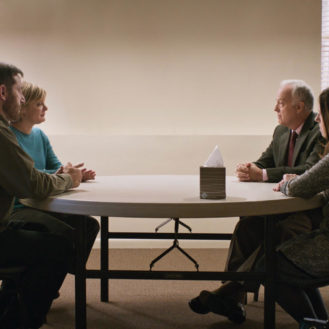Nicky’s Family is an elementarily formatted documentary using a cluster of different stock footage from the 1930’s, with interviews helping navigate the viewer through a touching real life tale. It’s a structure that’s very simple and we’ve all seen it before.
The documentary also appears to have been shot on substandard video, which leads to a dated image that’s generally murky with visible blemishes. Furthermore, the overall feeling of Nicky’s Family is strictly televisual. The film is currently accessible through DVD and VOD platforms, but it’s still confusing to me as to how Matej Mináč’s film obtained a theatrical release. Even if it is a limited one.
The educational values are high in Nicky’s Family. This should’ve graced small, accessible screens on networks like PBS and TVO – bypassing the silver screen altogether.
But, Nicky’s Family struck a chord that started pulling on my heartstrings in ways that weren’t cloying. My initial defensiveness toned itself down and I found myself enwrapped in the doc’s melancholic recounting of Nicholas Winton’s persistence to rescue Jewish children from a dreadful fate in a pre-WWII world.
For every child Winton saved through his detail-oriented organization, that youngster usually started a family later in their life. Winton, who is the definition of a generous soul, is continuously thanked by families influenced by him and is shown an abundance of gratitude on a daily basis.
We see attentive modern day classes of children and teens utterly hooked to Winton’s story through the man himself or through retellings by many of the survivors. These moments show us that this current younger generation is still hopeful when breathing in examples of tenacity and using the inspiration in their everyday lives. It provides a feeling of gratifying relief.
If you were ever one of those eager beavers who hung onto every word your Grandmother or Grandfather ever uttered to you in their musty living room while they told stories from their easy chair, you’ll be just as fastened to Nicky’s Family as I was.
A large portion of the doc is led by CBC news correspondent Joe Schleslnger – including most of the narration. Schleslnger, who was one of the many children rescued by Winton, is able to deliver details on-location while making matters personable. It doesn’t feel like he’s reading off of a script or cue cards, but rather teaching history that he’s excited to be talking about. With Schleslnger’s personal connection to the subject matter aside, he was a superb choice for this prominent role.
Mináč’s film also features reenactments. After having seen reenactments recently butchered in The Wagner Files, my worries started as soon as I saw the first actor enter the scene. Thankfully, these rehearsed segments are not littered with hyperbolized hammy acting. I thought each emotion was pulled off well by the cast, which says a lot since they are not called upon to speak. These scenes, unfortunately, still obtain that soft, washed over look to them that reminds you of how low-grade Nicky’s Family is and how much it occasionally resembles one of those commercials highlighting Canadian heritage.
However, I ask you one favour. While you may sit in the theatre and have seemingly unavoidable reservations about why you’re watching a television production in a movie house, I urge you to try and put those qualms to bed.
Beneath its surface is supreme importance and a story that moves you. By the final moments of Nicky’s Family, a lump started to develop in my throat which would’ve definitely led to me welling up if the film had gone on any longer. However, a lovely tribute during the last act will lift you up.
The doc does a fantastic job at informing about serious issues without dampening the film itself. It’s a tricky task, but Mináč has done an admirable job with this challenge.
At the end of the day, no matter where you catch Nicky’s Family, you’ll be glad you had seen it. It’s a reserved and respectful, little-engine-that-could type of film that’s worth your time.





Leave a comment